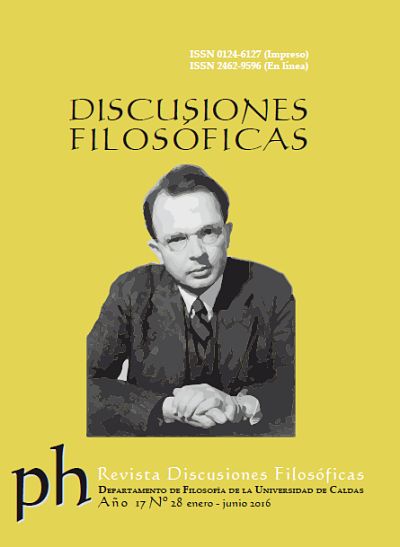Authors
Abstract
The main objection against Cartesian dualism in Philosophy of Mind is that it is incompatible with science. It has been argued, in particular, that the principle of causal closure of the physical world and the theorem of preservation of energy –as well as the concept of dynamic interaction of fundamental physics– overrule the postulation of causal interactions between thinking substances and extended ones. In this paper I argue that this conclusion is at least hasty and that it is not a trivial issue to refute Cartesian dualism by using empirical considerations. My theses are: (i) that the antidualistic criticisms based on scientific premises collapse into a metaphysically implausible reductionism; and (ii) that physical theory does not preclude the existence of a relation of causation or recurrent dynamic interaction as the one required in order to explain the conscious experience by postulating a pertinent link between immaterial minds and nervous systems.
References
Braddon-Mitchell, David & Jackson, Frank. Philosophy of Mind and Cognition. Oxford: Blackwell, 1996. Print.
Broad, Charlie. The Mind and its Place in Nature. London: Routledge & KeganPaul, 1925. Print.
Bunge, Mario. The Mind-Body Problem. Oxford: Pergamon Press, 1980. Print.
Chalmers, Davis. The Conscious Mind. New York: Oxford University Press, 1996. Print.
Donald, Matthew. “Quantum Theory and the Brain”. Proceedings of the Royal Society. 1990: 43–93. Print.
Dowe, Phil. Physical Causation. Cambridge: Cambridge University Press, 2000. Print.
Foster, John. The Immaterial Self: A Defense of the Cartesian Dualist Conception of the Mind. London: Routledge, 1991. Print.
Gibb, Sophie. “Introduction”. Sophie Gibb, Edward Jonathan Lowe & Rögnvaldur Ingthorsson (eds.). Mental Causation and Ontology. Oxford: Oxford University Press, 2013.
Jackson, Frank. “Epiphenomenal Qualia”. Philosophical Quarterly. 1982: 127–136. Print
Kim, Jaegwon. Mind in a Physical World. Cambridge: The MIT Press, 1998. Print.
Lewis, David. “What Experience Teaches”. William Lycan (ed.). Mind and Cognition: A Reader. Oxford: Blackwells, 1990. Print.
Lycan, William. “Philosophy of Mind”. Nicholas Bunnin & Eric TsuiJames (eds.). The Blackwell companion to Philosophy. Oxford: Blackwell Publishers, 1996. Print.
McGinn, Colin. “Can we solve the mind-body problem?” Mind. 1989: 349–366. Print.
Montero, Barbara. “What does the Conservation of Energy Have to Do with Physicalism?” Dialectica. 2006: 383–396. Print.
O’Connor, Timothy & Robb, David. “Introduction”. Timothy O’Connor & David Robb (eds.). Philosophy of Mind: Contemporary Readings. New York: Routledge. 2003. Print.
Rolleri, José. “La Teoría de la Explicación Causal de Salmon y la Mecánica Cuántica”. CRÍTICA, Revista Hispanoamericana de Filosofía. 1997: 3–35. Impreso.
Rosenberg, Gregg. A Place for Consciousness: Probing the Deep Structure of the Natural World. Oxford: Oxford University Press, 2005. Print.
Salmon, Wesley. Scientific Explanation and theCausal Structure ofthe World. Princeton: Princeton University Press, 1984. Print.
Schouten, Maurice. “Theism, Dualism, and the Scientific Image of Humanity”. Zygon. 2001: 679–708. Print.
Stapp, Henry. “Theory of Reality”. Foundations of Physics. 1977: 313–323. Print.
Stephan, Achim. “Armchair arguments against emergentism”. Erkenntnis. 1997: 305–314. Print
Suárez, Mauricio. “Procesos causales, realismo y mecánica cuántica”. Enrahonar. 2005: 141–168. Impreso.
Taliaferro, Charles. Consciousness and the Mind of God. Cambridge: Cambridge University Press, 1994. Print.
Toben, Bob. Space-Time and Beyond. New York: Dutton, 1974. Print.
Van Fraassen, Bas. “The Charybdis of Realism: Epistemological Implications of Bell’s Inequality”. James Cushing & Ernan McMullin (eds.). Philosophical consequences of quantum theory: reflections on Bell’s theorem. Notre Dame: University of Notre Dame Press, 1989. Print.
Wigner, Eugene. “Remarks on the Mind-Body Question”. Irving Good (ed.). The Scientist Speculates. New York: Basic Books, 1962. Print.

 pdf (Español (España))
pdf (Español (España))
 FLIP
FLIP




























